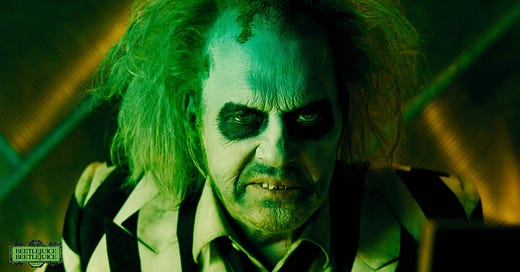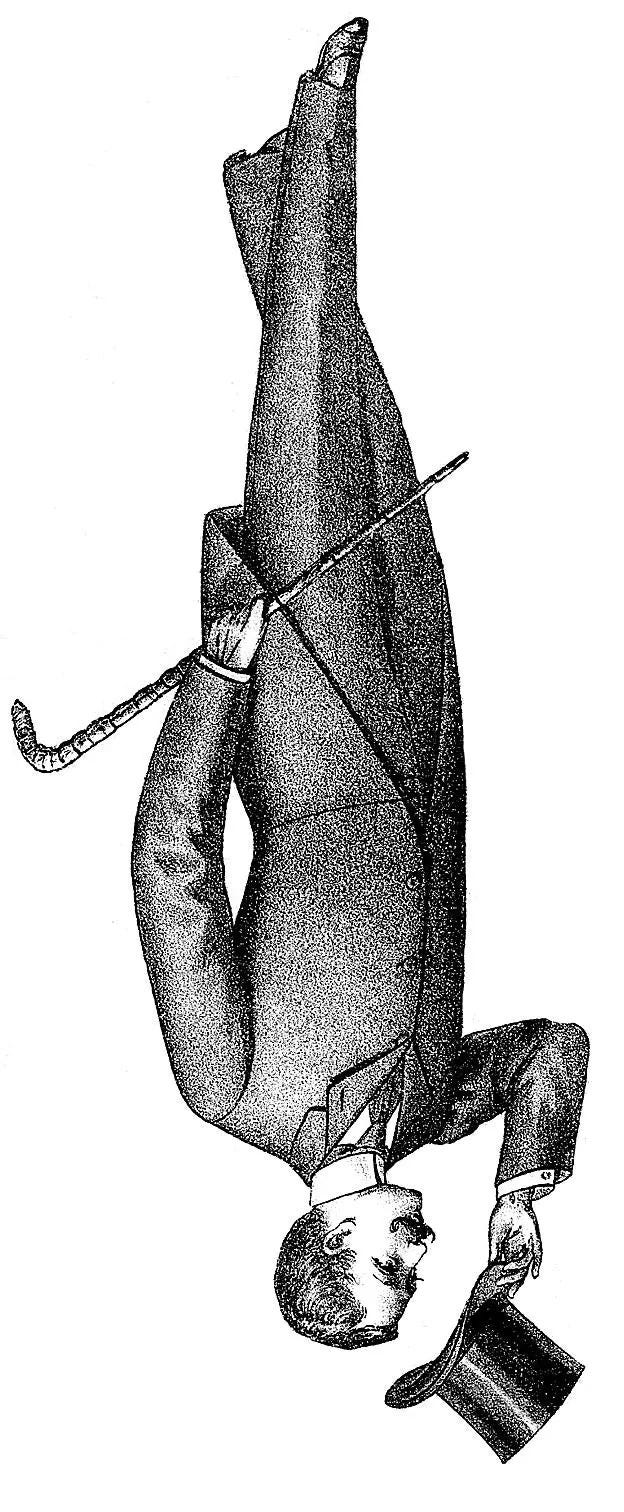Movie Review: Beetlejuice Beetlejuice
Dear Hollywood writers, please be advised that “Off” is a direction in which you can fuck.
Although I don’t remember where, I recall listening to a podcast where the speakers referred to a competency crisis as part of a larger labor crisis. Basically, we are experiencing a shortage of capable professionals. The key word is capable. There are professionals, but few can get the job done.
I had occasion to reflect on this idea a few times over the summer as I experienced or was told about experiences with less than capable professionals. The competency crisis once again came to shake its gory locks at me when I watched Beetlejuice Beetlejuice. Narratively speaking the movie was so poorly constructed that I now believe we are in a writing crisis.
Hollywood writers have struggled to produce serviceable movie scripts for a number of reasons. One reason is the shoehorning of moral or political messages into their films. Generally, audiences don’t like being lectured - especially by an industry that for years enabled predators like Harvey Weinstein.
Fortunately, that’s not the case for Beetlejuice Beetlejuice, which was written by Alfred Gough and Miles Millar along with Seth Grahame-Smith. One could argue that some messaging is present, but such arguments would be nitpicking. Moreover, the amount of messaging is negligible like the rat feces in your street-vendor hotdog. Anyway, I don’t wish to dwell on that issue. Instead, I want to discuss the writing crisis I believe we are experiencing using Beetlejuice Beetlejuice as a case study. I’ll do this by examining the story plot point by plot point.
Lydia Deetz (Winona Ryder) is the hostess of a ghost-hunting television program, and she is in a relationship with the show’s producer, Rory (Justin Theroux). The two are abusing drugs. The death of Lydia’s father brings the Deetz family together in their old home in Winter River, Connecticut, for the funeral. The relationships are strained, particularly that of Lydia and her daughter, Astrid (Jenna Ortega). Astrid believes her mother is a grifter and resents her for not using her medium powers (if true) to reconnect Astrid with her deceased father.
This is an adept setup. It establishes the characters, their relationships and hardships and forces them together under circumstances not of their choosing. However, things start to go wonky with the introduction of the titular ghoul.
In the original film, Betelgeuse (Michael Keaton) is the villain. But in Beetlejuice Beetlejuice he functions as both protagonist and antagonist. In the former role, Betelgeuse gets his own setup and inciting incident. A successful “bio-exorcist,” Betelgeuse has several ghosts in his employ. But his (un)livelihood is threatened by the return of his ex-wife, Delores (Monica Bellucci), who goes on a killing spree with the ultimate goal of … well, I don’t know what her ultimate goal is, exactly. She just wants revenge.
This secondary setup isn’t handled as well as the first. More importantly, it lengthens act one to an unbearable size. As the film approaches the middle of its run time, we still don’t have a real protagonist, a real antagonist or a real conflict. I use the qualifier “real” because there are inklings of these things, but said inklings are uncertain.
A few words need to be said about Delores before we move on. Her introduction suggests she will be the primary antagonist - that is, the big baddie with whom Betelgeuse will spar in the final showdown. However, she is barely on screen. While I didn’t time it, I’d guess she appears for a total of 10 minutes. This can work. Famously, Jack Nicholson only appeared on camera for 17 minutes in A Few Good Men, and his performance dominated that picture. Beetlejuice Beetlejuice is not A Few Good Men. Rather than being developed into a formidable opponent, Delores is left out of and forgotten about for a chunk of the movie until a brief walk-in reminds the audience that she’s still hunting for her ex-husband. And so, when the final showdown finally arrives, it falls flat.
One of the reasons Delores is forgotten about is because another potential antagonist takes center stage. Astrid strikes up a romantic relationship with a boy named Jermey (Arthur Conti). But it's soon revealed Jeremey is a murderous ghost who’ll return to Earth by sending Astrid to Hell in his place. Astrid is tempted by Jermey with the promise of reuniting with her dead father. This is a nice call-back to the conflict with her mother, Lydia. Because Lydia cannot use her medium powers to call forth the dead father, Jeremy’s offer is made more enticing. Moreover, this story arc forces Lydia to ask for Betelgeuse’s help.
There was a lot of potential here, but a number of bad writing decisions ruined it. First, the Astrid/Jeremy relationship is rushed. This is due, in part, to the bloated first act and the existence of too many other plots (e.g., Delores).
Second, it comes in the middle of the film for the same reasons.
Third, it further confuses the already dubious question of conflict, protagonist and antagonist. As already stated, these elements are not clearly defined. As best as I can tell there are four antagonists: Betelgeuse, Delores, Jermey and Rory. There are three protagonists: Lydia, Astrid and (confusingly) Betelgeuse. And there are a number of conflicts, which I won’t enumerate here.
None of the conflicts are resolved in a gratifying way. Betelgeuse, in deus ex machina fashion, saves Astrid from Jeremy. Although I did like the manner of Jeremy’s defeat, the resolution was too rushed to have any real emotional satisfaction. Meanwhile, Delores is dispatched easily; so much for being the big baddie. And finally, Lydia, who is contractually obligated to marry Betelgeuse, gets out of it by an obscure loophole in The Handbook for the Recently Deceased. To make it worse, said loophole was found by Astrid after 10 seconds of frantically searching the book. How convenient!
There is a lot more to be said, but I’ll summarize my remaining points. Astrid does find her dead father, but it means nothing because there was no emotional investment in that story arc. Delia Deetz’s (Catherine O’Hara) story is extraneous; it should have been cut. Willem Dafoe’s character doesn’t add anything, either, although I liked him.
Some have argued that Beetlejuice Beetlejuice is three films crammed into one. That hypothesis fits the evidence: there are three discernible story lines present here. Had each of those stories been extracted, developed independently and offered separately then we might have a series of decent movies.
I disagree with that assessment. I believe the writers Alfred Gough, Miles Millar and Seth Grahame-Smith don’t know the first thing about narrative structure. I question: have they taken a writing class? Have they even read a book? Or watched a well-plotted movie? The answers are undoubtedly “yes,” but they did not seem to do so critically or with an eye toward understanding. Therefore, they are not capable of writing one, two or three plot lines no matter how crudely smashed together. They are not capable of writing a movie whatsoever. What they did instead was string together a cluster of member berries: “Member sandworms?” “Member Lydia’s red wedding dress?” “Member shrunken-head guy?”
Beetlejuice (1988) was a fun film with a sizable following. Its fans deserved a worthy sequel. Unfortunately, that sequel was a victim of the competency crisis, which has struck the writers’ room. The crisis is so bad that Hollywood writers working on major, legacy films with huge cult followings and large budgets are incapable of putting together a coherent plot - a thing that a high school junior can do. Surely, we can do better than this.




